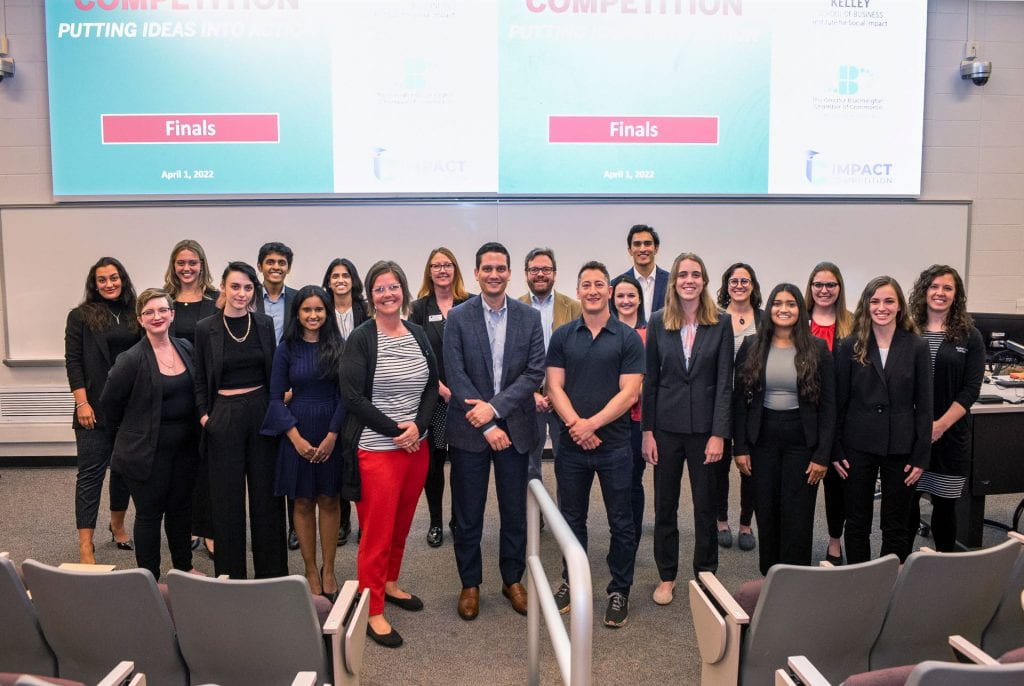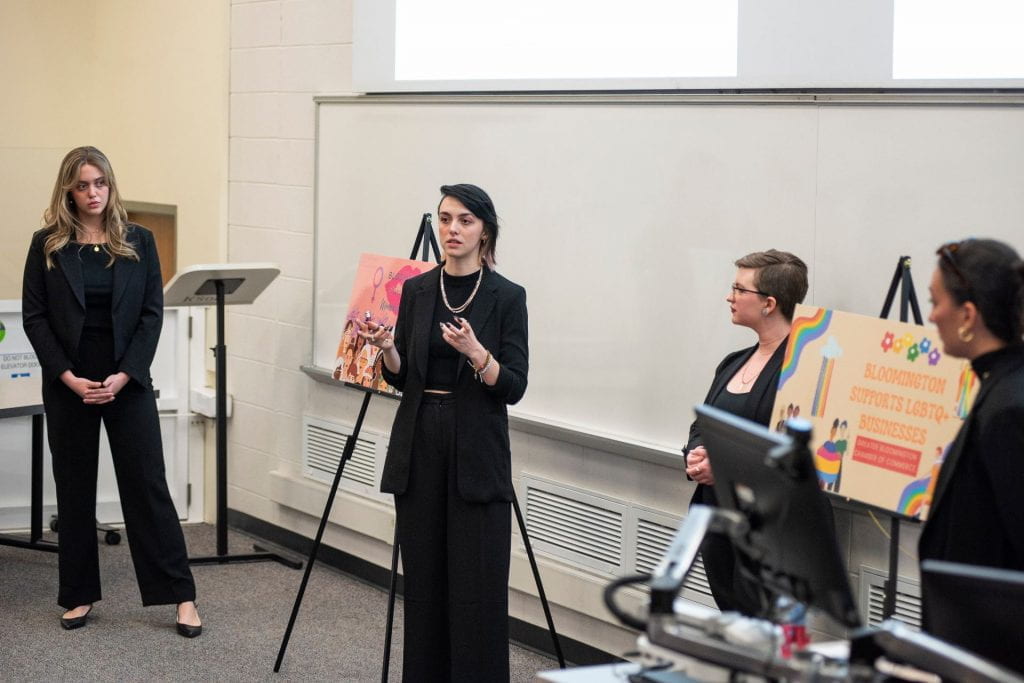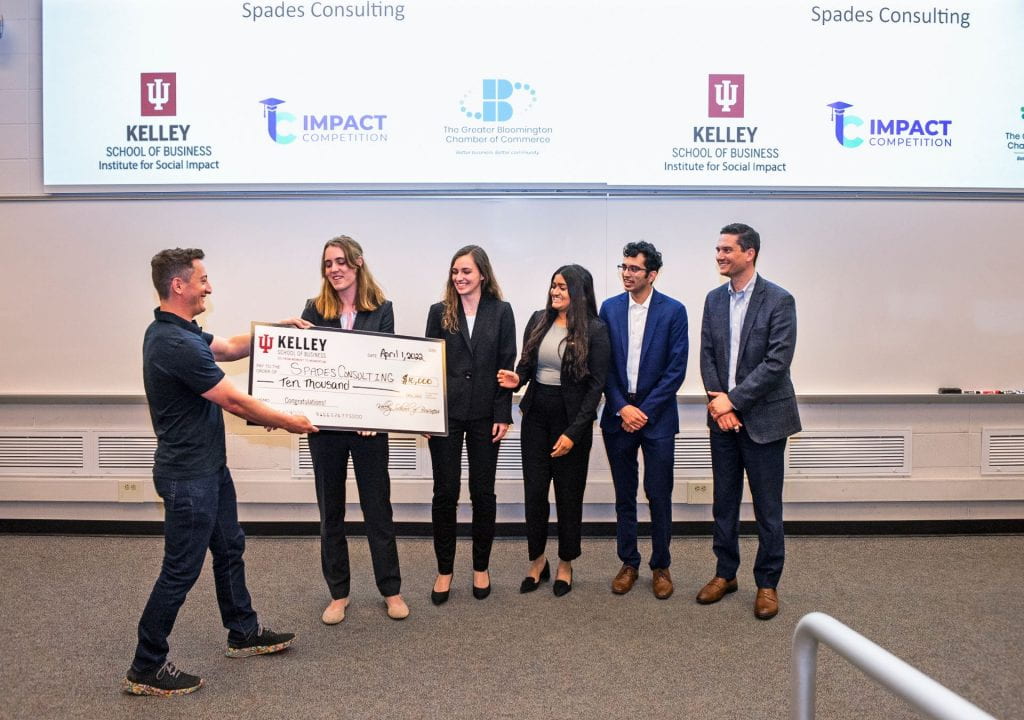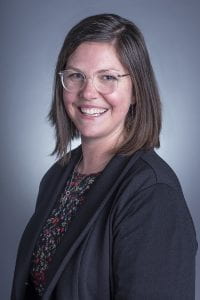
Hosted by the Kelley Institute for Social Impact, the Kelley Impact Case Competition brings together socially minded students in order to find and implement solutions to a social issue in Bloomington.
BLOOMINGTON, Ind. – As a student at the Indiana University Kelley School of Business, Lance Breitstein fell in love with the stock market. He read or watched anything he could find on the topic, whether it was a book, a blog or a video.
“What I realized was that I really wanted to go into the field of stock trading,” recalled Breitstein, a 2011 Kelley alumnus who today lives in Chicago.
After getting a bachelor’s degree in finance, Breitstein spent a “wonderful” decade working at Trillium Management, one of the nation’s first and fastest growing digital trading firms. He managed its Chicago office and became one of its top traders.

Lance Breitstein
But by 2018, Breitstein felt he had accomplished much of what he had set out to do professionally and began thinking about how he could give back. He was deeply affected by something he read, “The Life You Can Save,” a 2009 book that has fueled the effective altruism movement and inspired major philanthropists to give more effectively.
“I realized that it’s not so much ‘can we do these things.’ We can, but it’s a lot of psychological biases to giving that prevents these things. My realization was that it’s not about picking a cause, it’s more so how can you get each person doing their own little part,” he said.
Breitstein realized he wanted to do more than simply write checks to different causes — he wanted to find ways for himself and others to “exponentially amplify” giving in some form, whether it was time, money, or wisdom.
It went back to what he learned at Kelley about “compounding” — the process in which an asset’s earnings are reinvested to generate additional earnings over time. But instead of just a financial asset, it also could involve the “good that you can do.”
A new kind of case competition is born
Around that time, he came to Bloomington for a return visit at the Kelley School and found a shared desire to challenge students to find new ways to address and resolve social issues, starting with those faced in Bloomington.
With support from the school’s Kelley Institute for Social Impact, the Kelley Impact Competition was born. Students would be introduced to a local public service organization and a key challenge it faces and then compete for $15,000 in student prize money. Most importantly, the winning team would receive $10,000 in seed money to put the winning idea into action.
The competition is open to all IU undergraduate students. Organizers welcome participation from teams of four students who demonstrate a variety of academic and professional interests.
“What really struck a chord with me with the impact competition is that you’re able to get right out in front of these socially minded college students, who truly care about these issues, and you are empowering them and showing them that they can make a difference and tackle these issues in the community around them,” Breitstein said.
In 2019, students took on the issue of housing insecurity in partnership with Habitat for Humanity of Monroe County. The following year they focused on mental health and wellness – a timely issue as the nation went into the pandemic — working with the Bloomington chapter of the National Alliance on Mental Illness.
Last year, undeterred by the need to work remotely, the winning team presented solutions to help the Community Justice & Mediation Center better educate the community about its services, recruit more and diverse volunteers and find new channels for financial support.

Members of the team “Breaking New Ground” presented ideas for fostering greater DEI awareness in the chamber and beyond.
A focus this year on diversity, equity and inclusion
This year, the Kelley Impact Competition benefits the Greater Bloomington Chamber of Commerce and its efforts to foster cultural changes needed to fully address DEI inequities in the community. The finals in the competition took place on April 1, with Breitstein among those judging.
The winning team was Spades Consulting, which consisted of four sophomores — Kayla Oxley, from Newburgh, Indiana; Katie Cole, from Austin, Texas; Naina Prabhakar, from Bloomington, Indiana; and Ashwin Ramesh, from Aurora, Illinois. Their “B is Belonging” campaign won over the judges with its revenue generating coupon books and DEI certification for chamber businesses.
While there could only be one winner, all three finalist teams were invited by Eric Spoonmore, president and chief executive officer of the Greater Bloomington Chamber of Commerce, to continue consulting with his organization and meet with members of the board. “Our members are asking for the resources and tools they need to increase their ability to become more active with diversity, equity and inclusion for their businesses and our community,” he said.
The Kelley Impact Competition highlights how business has the power to drive positive change within communities. Unlike other case competitions, it is popular because it is not just theoretical. Students are thrilled to have an opportunity to implement their ideas and see they can create change in Monroe County.
“The fact that we now get to work with the community and see our solution better the lives of people in this town is really exciting, said Cole, who is majoring in marketing and business analytics.
“It’s really special, the collaboration that happens between the students and KISI community partners,” added Prabhakar, who is majoring in marketing and international business. “We very much look forward to actually working alongside this chamber of commerce that we’ve been so in tune with these past few months.”

Lance Breitstein, whose support makes the competition possible, presents a “check” to the winning team, joined by Eric Spoonmore, president and CEO of the Greater Bloomington Chamber of Commerce.
KISI provides outlets for socially engaged future leaders
In addition to the innovative ideas being shared by students, another legacy of the Kelley Impact Competition is that the concept has been incorporated into “C104 – Business Presentations,” an I-Core prerequisite course for all business undergraduates.
Since 2020, faculty and students in the class have partnered with Global Mamas, a fair-trade non-profit that works with female entrepreneurs in the African country of Ghana. Interestingly, three of the same students in Spades Consulting also won the C104 Global Mamas class case competition as freshmen.

Shawna Meyer-Niederman
Shawna Meyer-Niederman, associate director of the Kelley Institute for Social Impact, said it is important for students to see that their innovations are appreciated. “If there’s one thing that I hear from students, it’s that their ideas aren’t just hypothetical,” she said. “Part of it is that they get a budget that isn’t pretend. It’s ‘here’s $10,000 to do your idea for someone else, and we will help you implement it.’”
In 2020, the Kelley Institute for Social Impact – often referred to as KISI — celebrated its 10th anniversary. It serves as the umbrella office for social impact student-directed programs and organizations, such as the Alternative Break Program and Civic Leadership Development (which was established in 1988), as well as the annual campus Whirlpool-Habitat for Humanity build.
“KISI is very thankful that we’re the home for this competition and that it’s a very natural fit,” Meyer-Niederman said. “We’re very thankful that this opportunity found us as a way to engage with so many students.”
The fact that activities like the Kelley Impact Competition are part of her education is exciting, said Oxley, who is majoring in marketing and business analytics. “It was incredibly fulfilling for me, because I’ve always looked for opportunities that are fulfilling, that are always giving back,” she said. “It’s really hard to get experience like this anywhere else.”
“We want to graduate and become the next leaders in business and the fact that we’ve had these opportunities to learn how to lead with DEI, with social impact in mind is really profound and I think that’s such a great opportunity that KISI has given us,” Cole added.
What began at Kelley goes national
What began at Kelley is now a national movement. Pleased with what has been accomplished through his financial support here, Breitstein launched non-profit organization, The Impact Competition Foundation, so he can expand the concept to other universities. They include the University of Chicago and the University of Maryland. They also are in late stage talks with Penn State and Johns Hopkins University.
Part of his long-term vision is an archive of ideas that will come from students at Kelley and other universities with impact competitions. The plans will be made available through a web site so other organizations can replicate them and to benefit from them.
“We’re finding the issues that are going to be relevant to students and we’re tackling them in a local way so that students are empowered to make these changes,” he said. “It’s not necessarily about a competition or the non-profit we’re partnering with. The big picture mission of the impact competition is that we’re turning these students into long-term, lifetime volunteers, philanthropists, or just socially minded individuals in their life and career.
“The add-on benefit is that we’re then directly helping these non-profits.”